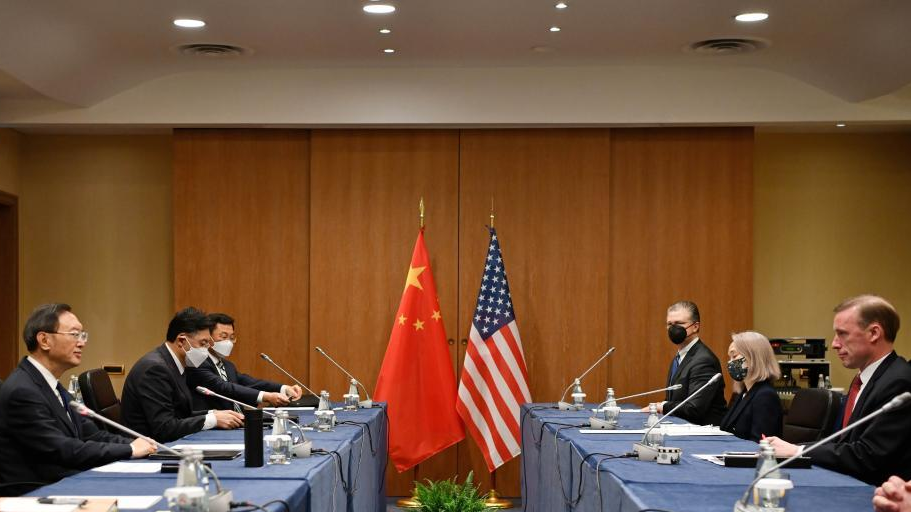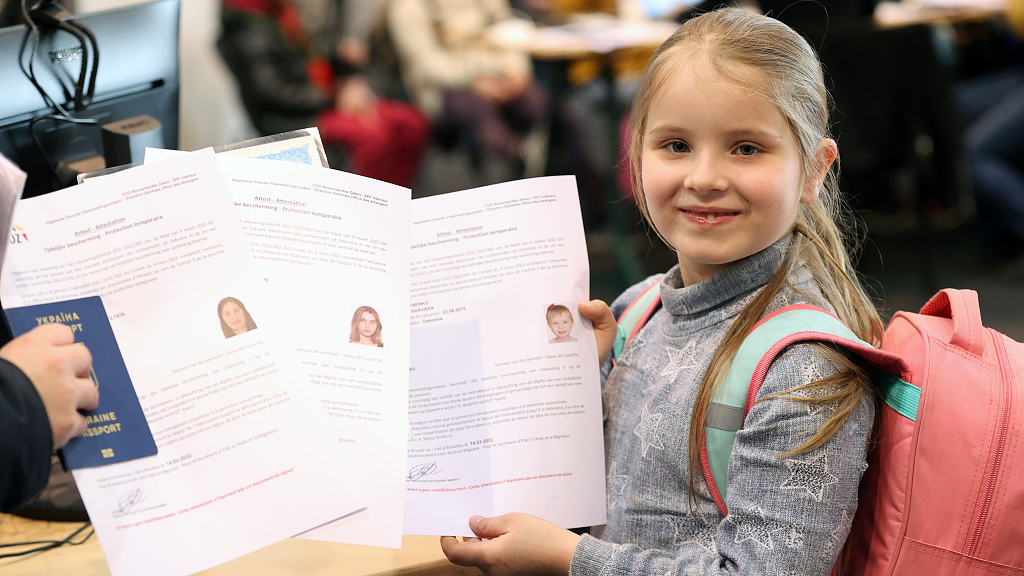
Yang Jiechi (1st L), a member of the Political Bureau of the Communist Party of China (CPC) Central Committee and director of the Office of the Foreign Affairs Commission of the CPC Central Committee, meets with U.S. National Security Advisor Jake Sullivan (1st R) in Rome, Italy, March 14, 2022. /Xinhua
Yang Jiechi (1st L), a member of the Political Bureau of the Communist Party of China (CPC) Central Committee and director of the Office of the Foreign Affairs Commission of the CPC Central Committee, meets with U.S. National Security Advisor Jake Sullivan (1st R) in Rome, Italy, March 14, 2022. /Xinhua
Editor's note: Yuan Sha is an assistant research fellow in the Department of American Studies at the China Institute of International Studies. A former Fulbright scholar at Columbia University, she has a PhD in international politics from China Foreign Affairs University. Yuan has published several papers on China-U.S. security relations in Chinese academic journals and regularly contributes to Chinese media outlets. The article reflects the author's opinions and not necessarily the views of CGTN.
China's top diplomat Yang Jiechi, a member of the Political Bureau of the Communist Party of China (CPC) Central Committee and director of the Foreign Affairs Commission of the CPC Central Committee, met with U.S. National Security Advisor Jake Sullivan in Rome, Italy, on March 14. The meeting was a follow-up to the China-U.S. virtual summit last November with the goal of implementing the consensus reached by the two heads of state. As tensions rise in Ukraine, the meeting has gained another layer of significance in that the international community expects the two countries to help defuse the crisis.
Ukraine crisis high on the agenda
Among a full plate of issues, the Ukraine crisis became a focal point of the Yang-Sullivan meeting. After all, it should be in the common interest of both countries to maintain peace and stability on the Eurasian continent.
Yang reiterated China's position that the sovereignty and territorial integrity of all countries must be respected and that the purposes and principles of the UN Charter must be observed. He urged all sides to exercise maximum restraint to prevent a large-scale humanitarian crisis. He also advocated for a vision of common, comprehensive, cooperative and sustainable security and encouraged the relevant parties to seek a balanced, effective and sustainable European security mechanism through equal dialogues on the principle of indivisible security.
Yang's stance reflected China's commitment to facilitating a peace settlement. China is attentively following the rapidly changing situation on the ground and has provided timely humanitarian assistance to the Ukrainian people. China, as a neutral and impartial country in this crisis, feels it is obligated to appeal against escalations and the use of sanctions due to its suspicious utility, human suffering and collateral damage to the fragile global economy. China is also concerned about the horrific news that the U.S. is developing chemical weapons in Ukraine. As the fourth round of Ukraine-Russia peace talks is about to get underway, it is imperative that all parties give peace a chance and prevent the situation from getting out of control.

A refugee child from Ukraine is seen at a newly opened registration center for Ukrainian refugees at the Brussels Fairground in Brussels, Belgium, March 14, 2022. /VCG
A refugee child from Ukraine is seen at a newly opened registration center for Ukrainian refugees at the Brussels Fairground in Brussels, Belgium, March 14, 2022. /VCG
Good-faith diplomacy needed
The Biden administration vowed that "diplomacy is back," but the fallout from the Ukraine crisis raised doubts about the genuineness of the U.S.'s diplomacy coupled with military, economic and diplomatic coercion.
It is undeniable that good-faith diplomacy is extremely important at this critical moment. President Xi Jinping held a virtual summit with French President Emmanuel Macron and German Chancellor Olaf Scholz last week, where the three leaders stated their common aspiration of preventing further escalation of the Ukraine crisis.
For China and the U.S., high-level communication channels have been up and running since last year. Yang and Sullivan met in Zurich, Switzerland, last October, which paved the way for a Xi-Biden virtual summit in November 2021. The Rome meeting was geared toward implementing the important consensus reached by the two leaders in November, where Xi proposed China-U.S. relations be based on the three principles of mutual respect, peaceful coexistence and win-win cooperation. Meanwhile, Biden vowed not to seek a new Cold War with China, not to change China's political system, not to strengthen alliances against China, not to support "Taiwan independence," and not to seek confrontation with China.
For this purpose, Yang raised China's position with Sullivan on China's core national interest issues, ranging from the Xinjiang Uygur Autonomous Region and Tibet Autonomous Region to the Hong Kong Special Administrative Region and Taiwan region. He particularly raised grave concerns and firm opposition to the recent U.S. provocations on Taiwan region and stressed the high sensitivity of the Taiwan question, which is about China's sovereignty and territorial integrity. He also asked that the U.S. abide by the one-China principle and its commitment inked in the three China-U.S. joint communiques and cautioned that any scheme to play the "Taiwan card" to contain China is doomed to fail.
Yang also stressed China's opposition against the U.S. malicious disinformation targeting China surrounding the Ukraine crisis. Before the meeting, the U.S. resorted to its traditional negotiation tactic of intentionally fanning up public opinion as a means to exert pressure on the other side. But such a tactic would do more harm than good by preventing the two sides from having good-faith conversations and would run the risk of further straining the bilateral relations.
(If you want to contribute and have specific expertise, please contact us at opinions@cgtn.com. Follow @thouse_opinions on Twitter to discover the latest commentaries in the CGTN Opinion Section.)

